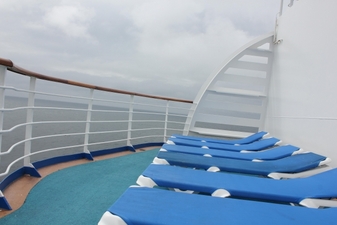- Free Initial Consultation: (954) 761-3641 Tap Here To Call Us
Sorrels v. NCL – Slip-and-Fall on Cruise Ship
The slip-and-fall injury case of Sorrels v. NCL dealt with the issue of coefficient of friction. This is a determination of how slippery a given surface is, and it can be an important point to make when asserting that a certain surface, as manufactured, was too slippery for its intended purpose.

The higher the coefficient of friction – or the ratio of force necessary to move on a horizontal surface – the less slippery a surface is.
Different industries have different standards for surface coefficient of friction. For example, the acceptable COF for the tile of an office building will be lower than the COF necessary for the walking surface a boat, where it’s foreseeable that water would regularly be found on that walking surface. more The Sorrels personal injury lawsuit stemmed from a slip-and-fall on a cruise ship. Plaintiff and her husband were on a cruise in the Bahamas in 2012 when she slipped on the pool deck of the ship. The surface was wet from a recent rain, and as a result of the fall, plaintiff suffered a fractured wrist. Both she and her husband sued the cruise line, alleging the company had been negligent. They did so under maritime law, which is what governs the liability of a cruise line for the slip-and-fall injury of a passenger.
Bolstering their claim of negligence was expert witness testimony from a civil engineer regarding the coefficient of friction on the boat’s surface. That testimony included individual tests conducted by the civil engineer on the same deck where plaintiff fell, though it was nearly two years later. He did so shortly after a rainfall. He found the slip resistance to be less than what it should have been as a walkway surface on a ship – it was 0.45 when it should have been a minimum 0.6 or higher.
Plaintiffs also sought to introduce into evidence a number of publications regarding the applicable slip-resistance standards for pool decks on cruise ships.
Defense filed a motion to suppress this expert witness testimony and those publications. Without this evidence, plaintiffs didn’t have much of a case. The district court granted the motion, finding the engineer’s methods were not reliable, and then granted summary judgment in favor of the defendant cruise line.
Plaintiffs appealed to the U.S. Court of Appeals for the Eleventh Circuit. Appellate panel ruled that while the district court was right to strike some of the positions of the expert witness, it erred in disallowing all expert witness testimony and the publications regarding coefficient of friction.
There had been no challenge to the engineer’s classifications, so the primary issue was the reliability of his opinions, which the appellate court found had merit. Summary judgment was reversed, and the case may proceed to trial.
Call Fort Lauderdale Injury Attorney Richard Ansara at (954) 761-4011. Serving Broward, Miami-Dade and Palm Beach counties.
Additional Resources: Sorrels v. NCL, Aug. 4, 2015, U.S. Court of Appeals for the Eleventh Circuit More Blog Entries: State Farm v. Earl – UM Coverage in Motorcycle Crash Case, Aug. 7, 2015, Fort Lauderdale Personal Injury Attorney Blog













